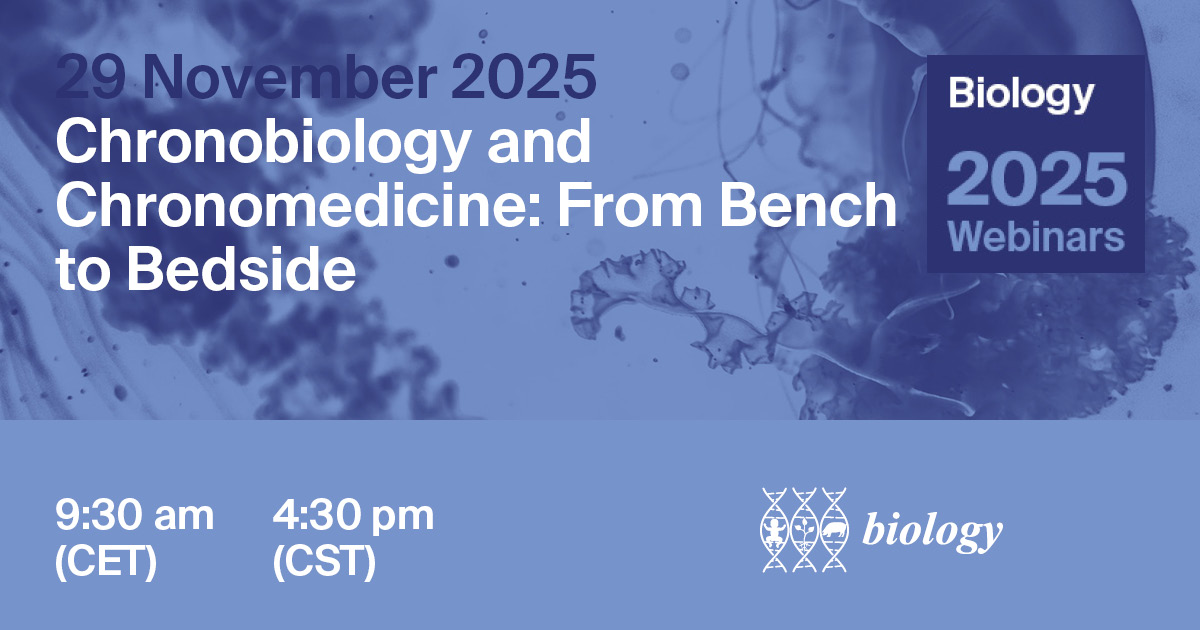
Biology Webinar | Chronobiology and Chronomedicine: From Bench to Bedside, 29 November 2025
Chronobiology is the scientific discipline that explores and quantifies the mechanisms of biological time structure and its relationship to the rhythmic manifestations in living beings. Due to rotation on its axis, the surface of the Earth is rhythmically exposed to solar irradiation, leading to light/darkness alternance and day/night cycles, called circadian (from the Latin circa diem meaning ‘about a day’), which affect the physiology of most living organisms. Biological clocks originally evolved in single-celled organisms to orchestrate cellular metabolism and adapt to geophysical cycles and anticipate cyclical, recurrent and predictable changes in their environmental niche.
Over the past three decades, growing scientific data regarding humans confirmed the fundamental involvement of circadian mechanisms in the regulation of physiological and behavioral rhythms as well as in the pathophysiological processes underlying the most common metabolic, inflammatory, neurodegenerative, and neoplastic diseases, along with the aging process. The use of a chronobiological methodology is crucial in basic, preclinical, and clinical research. It is now essential to implement a paradigm shift in scientific research and clinical practice (from bench to bedside), using a chronobiological methodology to improve the quality of basic scientific research and develop appropriately timed therapeutic interventions that take into account the temporal dimension of drug kinetics and dynamics, the circadian timing of the pharmacological target, and the temporal organization of the human organism. Chronomedicine and chronotherapy can significantly improve the results of basic research, the success of clinical trials, and ultimately, patients’ care.
In order to spread interest in and knowledge of chronobiological methodology, in 2025, Prof. Gianluigi Ubaldo Mazzoccoli and Prof. Giovanni Damiani founded the Italian Study Group in Chronobiology and Chronomedicine (GIS-CRONO).
We dedicate this webinar to the memory of Paolo Sassone-Corsi, a distinguished scientist and chronobiologist.
Date: 29 November 2025
Time: 9:30 a.m. CET to 12:30 p.m. CET | 4:30 p.m. CST to 7:30 p.m. CST
Register in advance for this webinar at the following link: https://us02web.zoom.us/webinar/register/5817593474141/WN_w60nldC0TxOhgmRWdK2n1Q
Webinar ID: 862 1051 8020
Webinar Secretariat: journal.webinar@mdpi.com
Webinar announcement: https://sciforum.net/event/Biology-5
Register now for free!
Program:
| Speaker/Presentation | Time in CEST |
| Prof. Gianluigi Ubaldo Mazzoccoli and Prof. Giovanni Damiani Chair Introduction |
9:30–9:40 a.m. |
| Prof. Nazzareno Capitanio Rythmicity in mitochondrial dynamics and function |
09:40–10:10 a.m. |
| Prof. Marina Maria Bellet Circadian pathogen dynamics and host metabolic rewiring upon infection |
10:10–10:40 a.m. |
| Prof. Carolina Greco Rhythmicity in cardiac physiology and metabolic facets in liver–heart crosstalk |
10:40–11:10 a.m. |
| Prof. Paola Tognini Circadian Rhythms in Heart–Brain Crosstalk: Chronobiological and Therapeutic Perspectives in Heart Failure |
11:10–11:40 a.m. |
| Dr. Filippo Pigazzani Chronotherapy of arterial hypertension: the role of individual chronotype |
11:40–12:10 a.m. |
| Q&A Session | 12:10–12:25 p.m. |
| Prof. Gianluigi Ubaldo Mazzoccoli and Prof. Giovanni Damiani Closing of Webinar |
12:25–12:30 p.m. |
After registering, you will receive a confirmation email containing information on how to join the webinar. Registrations with academic or institutional email addresses will be prioritized.
Unable to attend? Feel free to still register; we will inform you when the recording is available.
Webinar Chairs and Keynote Speakers:
- Prof. Gianluigi Ubaldo Mazzoccoli, Chronobiology Laboratory, Fondazione IRCCS Casa Sollievo della Sofferenza, Opera di Padre Pio da Pietrelcina, San Giovanni Rotondo, Italy;
- Prof. Giovanni Damiani, Center of Coordinated Research in Precision Medicine and Chronic Inflammation, University of Milan, Milan, Italy;
- Prof. Nazzareno Capitanio, Department of Clinical and Experimental Medicine, University of Foggia, Italy;
- Prof. Marina Maria Bellet, Department of Medicine and Surgery, University of Perugia, Italy;
- Prof. Carolina Greco, Humanitas Research Hospital/Humanitas University, Department of Biomedical Sciences Via Levi-Montalcini 4, Pieve Emanuele, Italy;
- Prof. Paola Tognini, Health Science Interdisciplinary Center. Scuola Superiore Sant’Anna, Pisa, Italy;
- Dr. Filippo Pigazzani, Division of Cardiovascular Research, School of Medicine, University of Dundee, Dundee, UK; Hypertension Research Centre (HRC) and Medicines Monitoring Unit (MEMO Research), School of Medicine, Dundee, UK.
Relevant Special Issue:
“Biological Rhythms and Molecular Clockworks in Physiology and Pathology (2nd Edition)”
Guest Editors: Prof. Gianluigi Mazzoccoli and Prof. Marina Maria Bellet
Deadline for manuscript submissions: 31 January 2027
